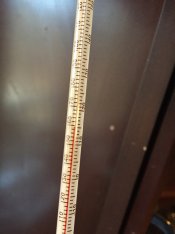- Joined
- Feb 9, 2010
- Messages
- 9,463
- Format
- 4x5 Format
This device (for educational purposes) has accuracy +/- 0.5 degrees C and resolution 0.07 degrees C.
That's accuracy +/- 0.9 degrees F and resolution 0.126 F
With a readout carried to 2 decimal places, I think the difference is not that important.
Especially since the accuracy is so terrible.
http://www.vernier.com/products/sensors/temperature-sensors/go-temp/
That's accuracy +/- 0.9 degrees F and resolution 0.126 F
With a readout carried to 2 decimal places, I think the difference is not that important.
Especially since the accuracy is so terrible.
http://www.vernier.com/products/sensors/temperature-sensors/go-temp/


 )
)



